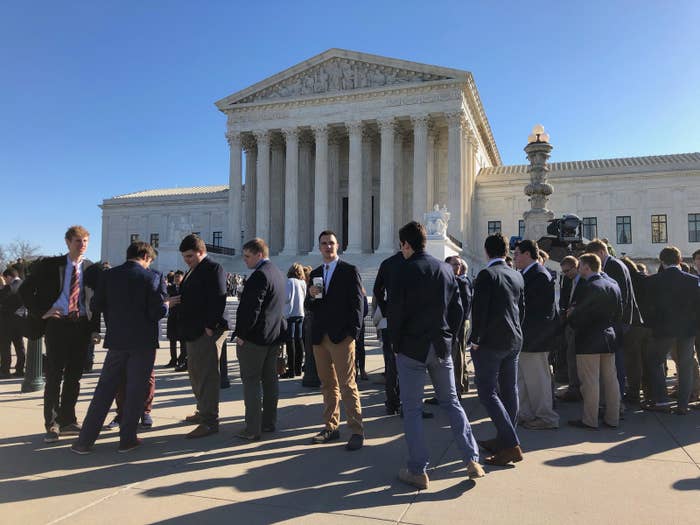
The Supreme Court ruled against a group of would-be immigrants seeking hearings over their detention on Tuesday.
Would-be immigrants who argue that they have a right to be in the country but have been detained pending possible deportation do not have a right under federal law to periodic bail hearings to determine whether they are appropriately being detained, the majority, led by Justice Samuel Alito, ruled.
The court did not, however, resolve the broader question of whether that interpretation of federal law violates the Constitution — sending that issue back to the lower courts to consider, now that the Supreme Court resolved questions about the underlying law.
Alito wrote the opinion for the court in Jennings v. Rodriguez, joined by the more conservative members: Chief Justice John Roberts and Justices Anthony Kennedy, Clarence Thomas, and Neil Gorsuch. Justice Stephen Breyer, joined by Justices Ruth Bader Ginsburg and Sonia Sotomayor, dissented. Justice Elena Kagan recused herself from considering the case.
As Breyer wrote in his dissenting opinion, which he read from the bench, the laws at issue concern a group of noncitizens who have been detained for extended periods of time — sometimes more than a year — pending potential removal but claim that they should be able to stay, including "asylum seekers, persons who have finished serving a sentence of confinement (for a crime), or individuals who, while lacking a clear entitlement to enter the United States, claim to meet the criteria for admission."
In Alito's opinion for the court, he criticized the US Court of Appeals for the 9th Circuit for its opinion, which had found that bail hearings were required under the provisions of law at issue after a person had been detained for 6 months. In reaching its conclusion, the appeals court had used the "canon of constitutional avoidance" — which basically asserts that, if there is a way to resolve a case without getting into constitutional questions by resolving it under the relevant statutory language, a court should do so.
Here, however, Alito wrote that the 9th Circuit misapplied the canon. The canon only comes into play, he wrote, where the law at issue "is found to be susceptible of more than one construction.” Alito continued, "The Court of Appeals misapplied the canon in this case because its interpretations of the three provisions at issue here are implausible." In other words, the case could not be resolved on statutory grounds because the three underlying provisions were not "plausibly" interpreted as requiring the periodic bail hearings.
Because the 9th Circuit had not, accordingly, considered the question of whether it violates the Constitution if there are not periodic bail hearings, the Supreme Court did not rule on that question — instead sending the case back for full consideration of the issue before any potential Supreme Court review.
In Breyer's dissenting opinion, which he read from the bench, he wrote that "the majority’s interpretation of the statute would likely render the statute unconstitutional." As such, he would use the canon, writing that he "would interpret the statute as requiring bail hearings, presumptively after six months of confinement."
The case was one of a small handful of cases that the court initially heard in its past term, but ordered to be reargued this past fall in its current term. The main difference this time around was that Gorsuch had joined the court for the second hearing on the case.
Notably, Thomas was joined by Gorsuch in a concurring opinion in which Thomas wrote that he believed "no court" had jurisdiction to hear the case because Congress has limited review of such cases. He went on to write that he joined Alito's opinion — which the exception of the jurisdictional question — because a majority of the court believes there is jurisdiction and because he "agree[s] with the court's resolution of the merits."

